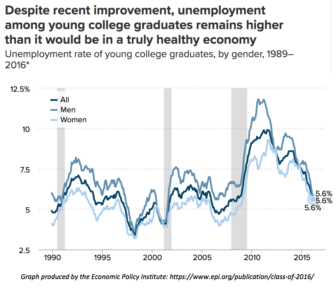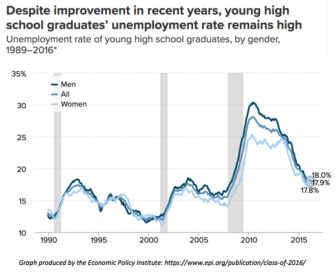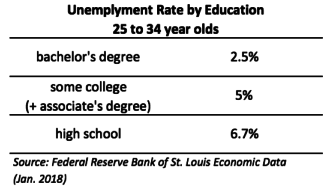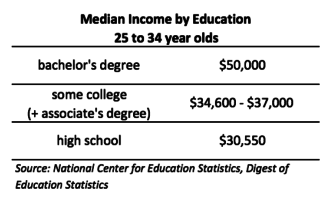![]() It passes for conventional wisdom these days that there’s a large mass of young college graduates (those with a four-year degree or more) who can’t find a job. Everyone seems to have a story about a friend of a friend whose son or daughter got a fancy degree from a fancy university, but is now living in their parents’ basement, with no skills and no prospects.
It passes for conventional wisdom these days that there’s a large mass of young college graduates (those with a four-year degree or more) who can’t find a job. Everyone seems to have a story about a friend of a friend whose son or daughter got a fancy degree from a fancy university, but is now living in their parents’ basement, with no skills and no prospects.
So prevalent is this narrative, it all but demands a bit of fact checking. So I looked at the numbers.
Young people always struggle in the labor market. Young college graduates struggle less
The first thing to know is that freshly minted college graduates always do worse than their more experienced peers. Employers, all else equal, would prefer to hire workers with experience. In the spring of 2016, the Economic Policy Institute looked at the unemployment rate for young college graduates, aged 21 to 24 – a fairly small group, as many college graduates don’t finish their degree until after age 24.
Despite that, the unemployment rate for this young but educated cohort was just 5.6 percent, roughly where it’s been for the past 25 years, outside of economic booms and busts.

But if this is slightly elevated, it doesn’t take long for young college grads to find their footing. The current unemployment rate for 25- to 34-year-olds with a BA is just 2.5 percent. If you’re surprised, you’re not the only one. Respondents to a New York Times survey in the spring of 2016 put the unemployment rate for 25- to 34-year-olds with a BA between 6.5 and 9 percent – despite being told that the unemployment rate for high school graduates with no further education was 7 percent. The myth of the college educated basement dweller is powerful indeed, but, as the data shows, it’s nothing more than a myth.
And while the unemployment rate for young college graduates is higher than for their somewhat older peers, the unemployment rate for young high school graduates that do not go on to college is incredibly high, up at 18% in the spring of 2016.

This rate also drops as these individuals enter the 25- to 34-year-old age bracket, but remains nearly two and a half times the unemployment rate for BAs.
Here are the numbers today for the 25- to 34-year-old age bracket: the unemployment rate for those with no education beyond high school is 6.7 percent; for those with some college (including an associate’s degree) it is 5 percent; and for those with a bachelor’s degree is 2.5 percent.

What about earnings?
Many of the anecdotes about the plight of college graduates have to do not with unemployed college grads but underemployed college grads – the graduate from a fancy college now working as a barista or in retail. Sure, these college grads may be employed, one might say, but they’re employed in low-level jobs that don’t require a college education.
Again, the data doesn’t support the anecdote. Or if it does, the coffee shops are paying pretty well.
A couple weeks ago, Lou wrote about how the wage premium associated with earning a bachelor’s degree continues to grow, contrary to the popular narrative. It turns out that this wage premium holds if we just look at the younger cohort as well. Based on 2015 data from the Current Population Survey, those in the 25 to 34 age bracket with a bachelor’s degree were earning a median of $50,000, far higher than those with an associate’s degree or some college ($34,600 to $37,000) and those with just a high school diploma ($30,550).

While there is some evidence that young college graduates today have slightly higher underemployment rates than young college graduates in the early 2000s (in this case, underemployment means working in a job that doesn’t require a bachelor’s degree), this is probably to be expected for graduates entering the economy after the Great Recession. But even in this case, underemployment doesn’t last long, with projected rates of underemployment dropping to historical norms by the time young college graduates reach their early 30s.
Looking at the whole picture
The overall point is this: attaining a bachelor’s degree is not an absolute guarantee of financial success – but it offers the best chance of success for young people entering a rapidly changing economy. It’s worth noting that this has not always been the case. In the mid-1970s, the bachelor’s degree wage premium narrowed considerably, as college graduates flooded the market and good-paying work could still be found with a high school diploma.
But in recent years, despite the fact that we have more college graduates in the labor market than ever before, the college wage premium has continued to increase, and these grads continue to be employed at far higher rates than their less educated peers.
All that to say, if you’re worried about that college graduate in your basement, rest easy – they should be out of the house soon enough.







